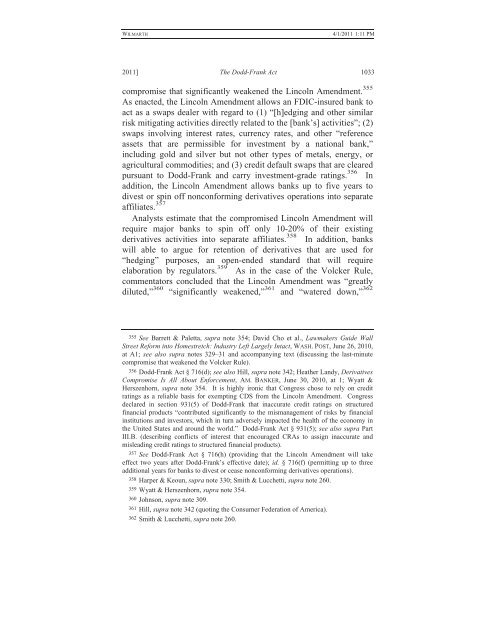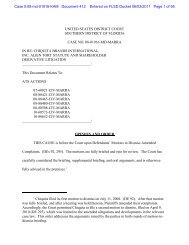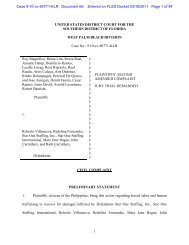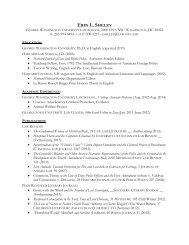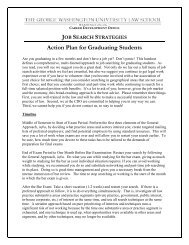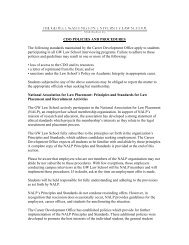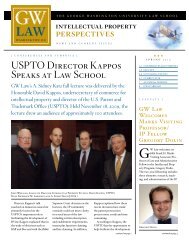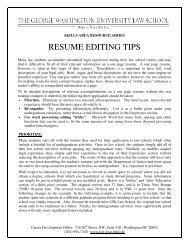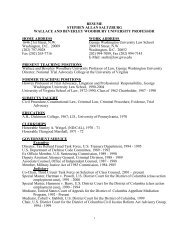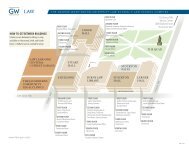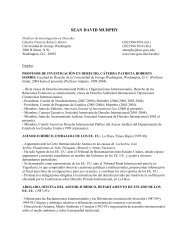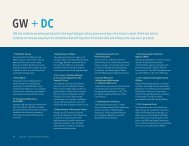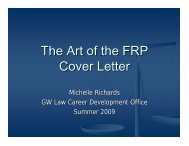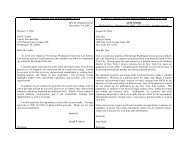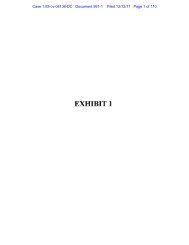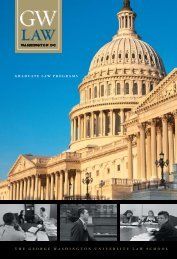CLE Materials for Panel #1 - George Washington University Law ...
CLE Materials for Panel #1 - George Washington University Law ...
CLE Materials for Panel #1 - George Washington University Law ...
You also want an ePaper? Increase the reach of your titles
YUMPU automatically turns print PDFs into web optimized ePapers that Google loves.
WILMARTH<br />
4/1/2011 1:11 PM<br />
2011] The Dodd-Frank Act 1033<br />
compromise that significantly weakened the Lincoln Amendment. 355<br />
As enacted, the Lincoln Amendment allows an FDIC-insured bank to<br />
act as a swaps dealer with regard to (1) “[h]edging and other similar<br />
risk mitigating activities directly related to the [bank’s] activities”; (2)<br />
swaps involving interest rates, currency rates, and other “reference<br />
assets that are permissible <strong>for</strong> investment by a national bank,”<br />
including gold and silver but not other types of metals, energy, or<br />
agricultural commodities; and (3) credit default swaps that are cleared<br />
pursuant to Dodd-Frank and carry investment-grade ratings. 356 In<br />
addition, the Lincoln Amendment allows banks up to five years to<br />
divest or spin off noncon<strong>for</strong>ming derivatives operations into separate<br />
affiliates. 357<br />
Analysts estimate that the compromised Lincoln Amendment will<br />
require major banks to spin off only 10-20% of their existing<br />
derivatives activities into separate affiliates. 358 In addition, banks<br />
will able to argue <strong>for</strong> retention of derivatives that are used <strong>for</strong><br />
“hedging” purposes, an open-ended standard that will require<br />
elaboration by regulators. 359 As in the case of the Volcker Rule,<br />
commentators concluded that the Lincoln Amendment was “greatly<br />
diluted,” 360 “significantly weakened,” 361 and “watered down,” 362<br />
355 See Barrett & Paletta, supra note 354; David Cho et al., <strong>Law</strong>makers Guide Wall<br />
Street Re<strong>for</strong>m into Homestretch: Industry Left Largely Intact, WASH.POST, June 26, 2010,<br />
at A1; see also supra notes 329–31 and accompanying text (discussing the last-minute<br />
compromise that weakened the Volcker Rule).<br />
356 Dodd-Frank Act § 716(d); see also Hill, supra note 342; Heather Landy, Derivatives<br />
Compromise Is All About En<strong>for</strong>cement, AM. BANKER, June 30, 2010, at 1; Wyatt &<br />
Herszenhorn, supra note 354. It is highly ironic that Congress chose to rely on credit<br />
ratings as a reliable basis <strong>for</strong> exempting CDS from the Lincoln Amendment. Congress<br />
declared in section 931(5) of Dodd-Frank that inaccurate credit ratings on structured<br />
financial products “contributed significantly to the mismanagement of risks by financial<br />
institutions and investors, which in turn adversely impacted the health of the economy in<br />
the United States and around the world.” Dodd-Frank Act § 931(5); see also supra Part<br />
III.B. (describing conflicts of interest that encouraged CRAs to assign inaccurate and<br />
misleading credit ratings to structured financial products).<br />
357 See Dodd-Frank Act § 716(h) (providing that the Lincoln Amendment will take<br />
effect two years after Dodd-Frank’s effective date); id. § 716(f) (permitting up to three<br />
additional years <strong>for</strong> banks to divest or cease noncon<strong>for</strong>ming derivatives operations).<br />
358 Harper & Keoun, supra note 330; Smith & Lucchetti, supra note 260.<br />
359 Wyatt & Herszenhorn, supra note 354.<br />
360 Johnson, supra note 309.<br />
361 Hill, supra note 342 (quoting the Consumer Federation of America).<br />
362 Smith & Lucchetti, supra note 260.


